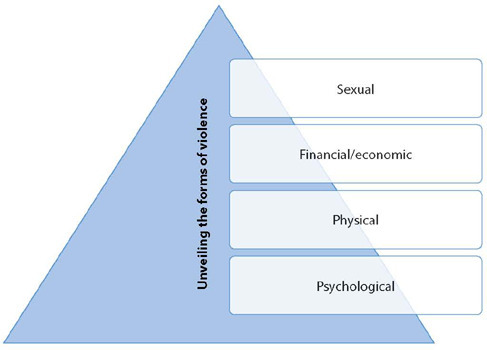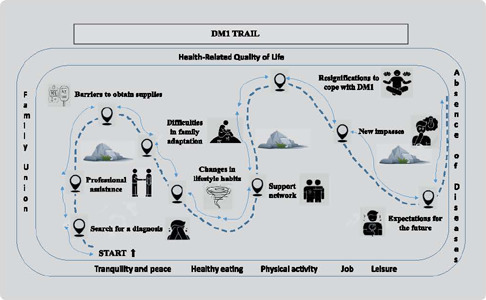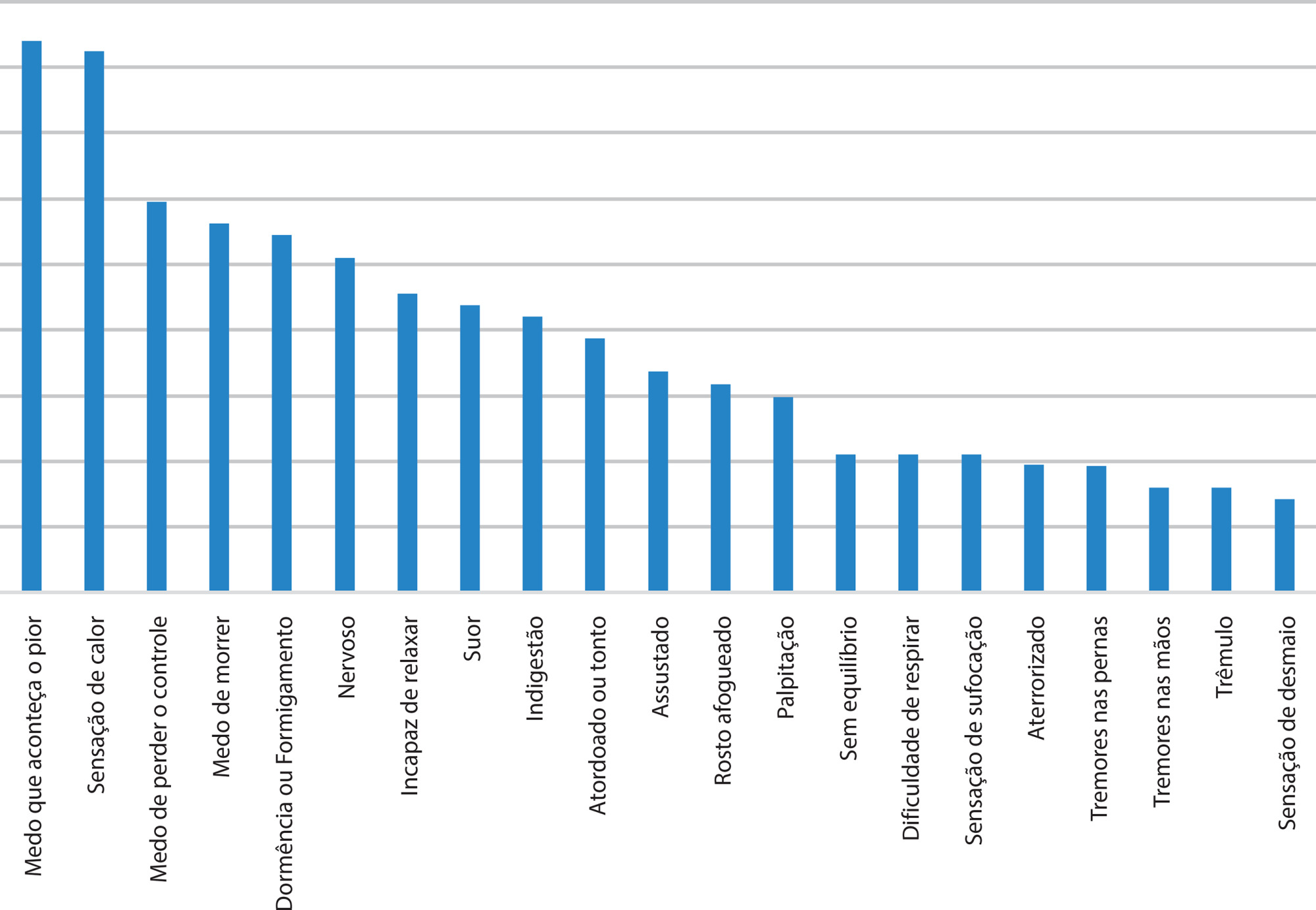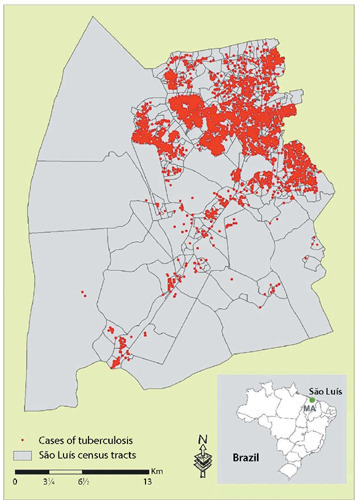-
ARTÍCULO ORIGINAL
Quality of life at work for health professionals during the COVID-19 pandemic
Revista Brasileira de Enfermagem. 2024;77:e20230461
28/06/2024
Resumo
ARTÍCULO ORIGINALQuality of life at work for health professionals during the COVID-19 pandemic
Revista Brasileira de Enfermagem. 2024;77:e20230461
28/06/2024DOI 10.1590/0034-7167-2023-0461
Visualizações0ABSTRACT
Objective:
to evaluate the quality of life at work of health professionals in direct and indirect care of COVID-19 cases.
Methods:
this was a cross-sectional study with 156 health professionals from a referral hospital. The relationship between sociodemographic and work-related variables and perceived stress and domains of the Quality of Life at Work Scale was investigated using inferential statistics and regression.
Results:
Satisfaction with Compassion was moderate (mean: 38.2), with low perception of stress, Burnout and Secondary Traumatic Stress (means: 18.8, 21.6 and 19.1). There were associations between: education, salary, multiple jobs and direct care with Compassion Satisfaction; low income, being a nurse and working overtime with Burnout; and working more than 12 hours, underlying disease and hospitalization for COVID-19 with Secondary Traumatic Stress.
Conclusion:
quality of life at work was satisfactory, despite the presence of Burnout and Secondary Traumatic Stress.
Palavras-chave: Occupational HealthOccupational StressPsychological BurnoutQuality of LifeWorking ConditionsVer mais -
ARTÍCULO ORIGINAL
Quality of Care Transition for COVID-19 Patients in a University Hospital in Southern Brazil
Revista Brasileira de Enfermagem. 2024;77:e20230402
28/06/2024
Resumo
ARTÍCULO ORIGINALQuality of Care Transition for COVID-19 Patients in a University Hospital in Southern Brazil
Revista Brasileira de Enfermagem. 2024;77:e20230402
28/06/2024DOI 10.1590/0034-7167-2023-0402
Visualizações0ABSTRACT
Objective:
To assess the quality of care transition from hospital to home for COVID-19 patients.
Method:
A cross-sectional study conducted at a University Hospital in Southern Brazil, involving 78 patients discharged after COVID-19 hospitalization. Data collection was performed via telephone using the Brazilian version of the Care Transitions Measure (CTM-15). Data were analyzed using descriptive and analytical statistics.
Results:
The mean quality of care transition was 70.8 on a scale ranging from zero to 100, indicating moderate quality of care transition. The highest score was attributed to factor 1, “Preparation for self-management,” and the lowest to factor 4, “Care Plan.”
Conclusions:
It is important to enhance communication and support provided to patients during the transition process, especially regarding understanding prescribed medications and the development of clear care plans.
Palavras-chave: Continuity of Patient CareCOVID-19HospitalsPatient DischargeTransitional CareUniversityVer mais -
ARTÍCULO ORIGINAL
Giving meaning to internalized violence throughout life by older adults living in rural areas
Revista Brasileira de Enfermagem. 2024;77(3):e20230163
17/06/2024
Resumo
ARTÍCULO ORIGINALGiving meaning to internalized violence throughout life by older adults living in rural areas
Revista Brasileira de Enfermagem. 2024;77(3):e20230163
17/06/2024DOI 10.1590/0034-7167-2023-0163
Visualizações0Ver maisABSTRACT
Objectives:
to understand the meanings of violence internalized throughout life by older adults living in rural areas.
Methods:
a qualitative study, anchored in the Symbolic Interactionism theoretical framework and the Grounded Theory methodological framework in the constructivist aspect. Data collection occurred through individual interviews. Data were coded using the Atlas.ti software.
Results:
it was possible to identify that the context of rural areas strengthens patriarchy culture as well as contributing to violence silence and naturalization. It was also found that violence is a product of social inequality and gender inequality.
Final Considerations:
older adults living in rural areas internalized the violence suffered in a unique way, and this scenario’s specific aspects can increase intra-family abuse, as there is a patriarchal culture that promotes social and gender inequality.

-
ARTÍCULO ORIGINAL
Quality of life associated with nursing professionals’ individual resources and work
Revista Brasileira de Enfermagem. 2024;77(3):e20230476
17/06/2024
Resumo
ARTÍCULO ORIGINALQuality of life associated with nursing professionals’ individual resources and work
Revista Brasileira de Enfermagem. 2024;77(3):e20230476
17/06/2024DOI 10.1590/0034-7167-2023-0476
Visualizações0Ver maisABSTRACT
Objectives:
to assess the physical and mental components of nursing professionals’ quality of life and associate them with individual, health and work characteristics.
Methods:
cross-sectional research, with nursing professionals from a university hospital in São Paulo. Own questionnaire and validated instruments were applied.
Results:
the overall quality of life was compromised. The physical component was lower in relation to low family income and among those who perceived greater control/pressure at work, and better for those who practiced physical activity and had support of leader and organization. The mental component was lower in professionals who reported dissatisfaction with work, worse self-rated physical health and were older. Scores for both components reduced due to work-related illnesses, worse work ability and increased daytime sleepiness.
Conclusions:
quality of life was statistically associated with controllable institutional factors and individual resources that, except age, can be promoted.
-
ARTÍCULO ORIGINAL
Website for families of non-breastfed children: development and validation of content and interface
Revista Brasileira de Enfermagem. 2024;77(3):e20230490
17/06/2024
Resumo
ARTÍCULO ORIGINALWebsite for families of non-breastfed children: development and validation of content and interface
Revista Brasileira de Enfermagem. 2024;77(3):e20230490
17/06/2024DOI 10.1590/0034-7167-2023-0490
Visualizações0ABSTRACT
Objectives:
to develop and validate the content and interface of a guidance website to support families in promoting Food and Nutrition Security for children under six months who are not breastfed.
Methods:
methodological study, Knowledge Translation, in two stages of creation: 1) content and validation on the criterion of accuracy in a panel of experts; 2) interface and validation on the criteria of content, language, illustrations, layout, motivation, culture and applicability.
Results:
the “Milky Way” website is freely available: . The content was structured in a decision tree made up of types of milk: milk formula, whole cow’s milk and powdered milk; and utensils: bottle, cup and measuring spoon. There were 46 illustrations to elucidate the content, facilitate understanding and engage the target population. The Content Validity Index was 0.91.
Conclusions:
the website is a validated technology with evidence-based written and pictorial content translated for use with families.
Palavras-chave: Educational TechnologyFamilyFood SecurityInfant HealthTranslational Science, BiomedicalVer mais
-
ARTÍCULO ORIGINAL
Meanings attributed to health-related quality of life by caregivers of adolescents with diabetes
Revista Brasileira de Enfermagem. 2024;77(2):e20230314
14/06/2024
Resumo
ARTÍCULO ORIGINALMeanings attributed to health-related quality of life by caregivers of adolescents with diabetes
Revista Brasileira de Enfermagem. 2024;77(2):e20230314
14/06/2024DOI 10.1590/0034-7167-2023-0314
Visualizações0Ver maisABSTRACT
Objective:
to interpret the meanings attributed to the health-related quality of life by caregivers of adolescents with type 1 diabetes mellitus.
Methods:
qualitative, descriptive-exploratory study of 14 caregivers of adolescents with diabetes developed at the reference outpatient clinic for endocrine diseases in a city in the state of Paraíba. Interviews were performed between May and September 2021. Inductive thematic analysis of the empirical material, and its interpretation in light of the concepts of health-related quality of life and family functioning were performed.
Results:
the meanings attributed by caregivers to the health-related quality of life of adolescents converged on the feeling of being healthy, healthy eating, satisfactory family income, family involvement in care and effective access to the care network.
Final Considerations:
knowledge of these meanings enables health professionals to develop strategies that meet the unique demands of caregivers experiencing this diagnosis.

-
ARTÍCULO ORIGINAL
Qualidade de vida de idosos institucionalizados com e sem sinais de depressão
Revista Brasileira de Enfermagem. 2019;72:127-133
05/12/2019
Resumo
ARTÍCULO ORIGINALQualidade de vida de idosos institucionalizados com e sem sinais de depressão
Revista Brasileira de Enfermagem. 2019;72:127-133
05/12/2019DOI 10.1590/0034-7167-2018-0316
Visualizações0RESUMO
Objetivo:
comparar a qualidade de vida (QV) de idosos residentes em instituições de longa permanência com ou sem sinais de depressão, e identificar variáveis sociais, de atividade física, lazer, saúde e atividades básicas da vida diária (ABVD) que se correlacionam aos escores de QV.
Método:
estudo transversal realizado com 101 idosos institucionalizados. A regressão linear múltipla foi usada para a análise dos dados.
Resultados:
sinais de depressão alteraram negativamente a QV nos domínios: autonomia, atividades presentes, passadas e futuras, participação social, intimidade e escore total; idosos dependentes para a realização das ABVD apresentaram QV inferior nos domínios: autonomia, participação social e escore total; dançar sem limitação de movimento, gostar do residencial e não apresentar sinais de depressão foram as variáveis que influenciaram positivamente a QV dos idosos.
Conclusão:
suporte social e psicológico, boas condições de moradia e assistência estimuladora podem melhorar a QV de idosos institucionalizados.
Palavras-chave: Atividades CotidianasDepressãoIdosoInstituição de Longa Permanência para IdososQualidade de VidaVer mais -
ARTÍCULO ORIGINAL
Nurses defending the autonomy of the elderly at the end of life
Revista Brasileira de Enfermagem. 2019;72(6):1639-1645
21/10/2019
Resumo
ARTÍCULO ORIGINALNurses defending the autonomy of the elderly at the end of life
Revista Brasileira de Enfermagem. 2019;72(6):1639-1645
21/10/2019DOI 10.1590/0034-7167-2018-0768
Visualizações0Ver maisABSTRACT
Objective:
to understand how nurses deal with the elderly’s autonomy at the end of life.
Method:
qualitative, exploratory study, guided by the Grounded Theory. Ten nurses, eight doctors and 15 nursing technicians were interviewed between November 2016 and May 2017 at a university hospital in Rio de Janeiro/Brazil.
Results:
nurses deal with the elderly’s autonomy in compliance with the code of ethics and exercise leadership in actions and interactions to defend this right, evaluating, guiding and listening to the preferences of the elderly; interacting with the family; and sharing information with the health team.
Final considerations:
the elderly’s autonomy must be ensured in care planning, based on patient-centered communication and developed in the interaction among agents involved in care. The discussion on “Living Wills” Health Care Directives and principles of palliative care must be encouraged.
-
ARTÍCULO ORIGINAL
Spirituality and religiousity in the experience of suffering, guilt, and death of the elderly with cancer
Revista Brasileira de Enfermagem. 2020;73:e20190034
08/07/2020
Resumo
ARTÍCULO ORIGINALSpirituality and religiousity in the experience of suffering, guilt, and death of the elderly with cancer
Revista Brasileira de Enfermagem. 2020;73:e20190034
08/07/2020DOI 10.1590/0034-7167-2019-0034
Visualizações0Ver maisABSTRACT
Objective:
to understand spirituality and religiosity in the experience of suffering, guilt, and death of the elderly with cancer.
Method:
qualitative research based on Viktor Frankl’s Existential Analysis. Twenty phenomenological interviews were conducted with people over 60 years old undergoing chemotherapy treatment at an oncology unit of a hospital in the city of Salvador, Bahia State, Brazil, between August and October 2018.
Results:
the following categories emerged: Experiences spirituality and religiosity in the face of the tragic triad and existential emptiness; Uses spirituality/religiosity as resilience strategies. After apprehension of ontic aspects, it was possible the ontological understanding of spirituality and religiosity in the face of suffering, guilt, and death experienced in the elderly with cancer’s daily life.
Final considerations:
spirituality and religiosity were understood as coping strategies used in the unstable experience of the elderly with cancer, providing comfort and resilience.
-
INFORME DE EXPERIENCIA
Collaborative practices from health care teams to face the covid-19 pandemic
Revista Brasileira de Enfermagem. 2020;73:e20200470
26/10/2020
Resumo
INFORME DE EXPERIENCIACollaborative practices from health care teams to face the covid-19 pandemic
Revista Brasileira de Enfermagem. 2020;73:e20200470
26/10/2020DOI 10.1590/0034-7167-2020-0470
Visualizações0ABSTRACT
Objective:
To report the experience of collaborative practices facing the COVID-19 pandemic.
Methods:
This is a report about the experience of collaborative practices conducted by health care teams in emergency service in the Emergency Care Units facing of COVID-19 pandemic in the city of Fortaleza, State of Ceará, in the first semester of 2020.
Results:
Collaborative actions, cooperation and effective communication among nursing and medical team contribute to the management of mild and complex cases of COVID-19, as well as qualify them in suitable and necessary care and confrontation measures.
Final considerations:
The report shows the need for collaborative practices to minimize negative effects on the population in the face of the new coronavirus pandemic.
Palavras-chave: Coronavirus InfectionsEmergenciesInterdisciplinary PracticesNursing, TeamPatient Care TeamVer mais
-
ARTÍCULO ORIGINAL
Ansiedade e depressão em cuidadores informais de idosos dependentes: um estudo analítico
Revista Brasileira de Enfermagem. 2020;73:e20190851
21/09/2020
Resumo
ARTÍCULO ORIGINALAnsiedade e depressão em cuidadores informais de idosos dependentes: um estudo analítico
Revista Brasileira de Enfermagem. 2020;73:e20190851
21/09/2020DOI 10.1590/0034-7167-2019-0851
Visualizações0Ver maisRESUMO
Objetivo:
Analisar os sintomas de ansiedade e depressão em cuidadores informais de idosos dependentes em domicílio.
Métodos:
Estudo analítico, transversal, realizado no município de Teresina (PI), com cuidadores informais de idosos dependentes. A coleta de dados ocorreu no período de novembro de 2017 a fevereiro de 2018, por meio de um formulário de caracterização do idoso dependente e seu cuidador, Inventário de Ansiedade de Beck (BAI) e Inventário de Depressão de Beck (BDI). Utilizou-se o modelo de regressão linear forward para identificação das variáveis preditoras de ansiedade e depressão.
Resultados:
Constatou-se que 18,4% dos cuidadores apresentaram sintomas de depressão; e 14%, ansiedade moderada a severa. Houve correlação entre ansiedade e depressão (p = 0,000).
Conclusão:
Os achados deste estudo possibilitam a avaliação da ansiedade e depressão nos cuidadores de idosos dependentes, sendo possível, mediante tais parâmetros, visualizar o perfil e as demandas de cuidado dessa população.

-
ARTÍCULO ORIGINAL
Estresse e qualidade do sono em alunos de graduação em Enfermagem
Revista Brasileira de Enfermagem. 2020;73:e20180227
15/05/2020
Resumo
ARTÍCULO ORIGINALEstresse e qualidade do sono em alunos de graduação em Enfermagem
Revista Brasileira de Enfermagem. 2020;73:e20180227
15/05/2020DOI 10.1590/0034-7167-2018-0227
Visualizações0Ver maisRESUMO
Objetivo:
analisar o nível de estresse e a qualidade do sono em estudantes de enfermagem por períodos do curso.
Método:
pesquisa descritiva e transversal desenvolvida em uma instituição de ensino superior do Nordeste brasileiro com 167 estudantes. Utilizaram-se, para coleta de dados, informações sociodemográficas e uma escala de avaliação do estresse e qualidade do sono em estudantes de enfermagem.
Resultados:
identificou-se diferença estatística significante entre os domínios da escala de estresse e os períodos do curso de graduação, e entre a qualidade do sono e os períodos do curso, como no quarto e sexto períodos. Conclusão: os diferentes escores do estresse demonstram que o semestre do estudante que mais o preocupa é o quinto. A qualidade de sono mostrou-se de boa qualidade para o primeiro, terceiro, quinto, sétimo e oitavo períodos; e qualidade ruim de sono para o quarto e sexto períodos.
-
EDITORIAL
Investigación cualitativa en tiempos de pandemia
Revista Brasileira de Enfermagem. 2021;74:e74Suppl101
11/06/2021
Resumo
EDITORIALInvestigación cualitativa en tiempos de pandemia
Revista Brasileira de Enfermagem. 2021;74:e74Suppl101
11/06/2021DOI 10.1590/0034-7167.202174Suppl101
Visualizações0INTRODUCCIÓNLa investigación cualitativa permite comprender realidades singulares difíciles de aprehender desde una única perspectiva, asumiéndose cada vez más como un campo inter y transdisciplinario–, con métodos y técnicas específicas que implican la relación entre el investigador y los participantes para la recolección, análisis y validación de transcripciones y análisis realizados por el investigador.La pandemia SARS-CoV-2 […]Ver mais -
ARTÍCULO ORIGINAL
Quality of life of nurse practitioners during the COVID-19 pandemic
Revista Brasileira de Enfermagem. 2022;75:e20201382
18/10/2022
Resumo
ARTÍCULO ORIGINALQuality of life of nurse practitioners during the COVID-19 pandemic
Revista Brasileira de Enfermagem. 2022;75:e20201382
18/10/2022DOI 10.1590/0034-7167-2020-1382
Visualizações0Ver maisABSTRACT
Objective:
to assess the quality of life of nurse practitioners during the COVID-19 pandemic and analyze related factors.
Methods:
cross-sectional and analytical study carried out with nurse practitioners. A questionnaire on sociodemographic characterization, work activities and changes perceived with the pandemic and WHOQOL-bref were used. To compare the groups of interest, analysis of covariance was used.
Results:
572 professionals participated, who had a mean total quality of life score of 56.79 (SD=13.56). In the relationship of variables with WHOQOL-bref, having two or more jobs and being a nurse were associated with better quality of life, but being a woman and working more than 50 hours a week was associated with a worse perception of the construct.
Conclusions:
the factors analyzed indicate a lower perception of quality of life associated with the social domain, requiring interventions that reduce the damage to professionals’ health and contribute to quality of care provided.
Búsqueda
Buscar en:
Nuvem de Tags
Adolescente (85) Atenção Primária à Saúde (239) COVID-19 (91) Criança (91) Cuidados de Enfermagem (269) Educação em Enfermagem (151) Educação em Saúde (139) Enfermagem (930) Enfermagem Pediátrica (86) Estudantes de Enfermagem (77) Estudos de Validação (131) Família (87) Idoso (208) Promoção da Saúde (99) Qualidade de Vida (104) Saúde do Trabalhador (86) Saúde Mental (145) Saúde Pública (82) Segurança do Paciente (150) Tecnologia Educacional (100)





